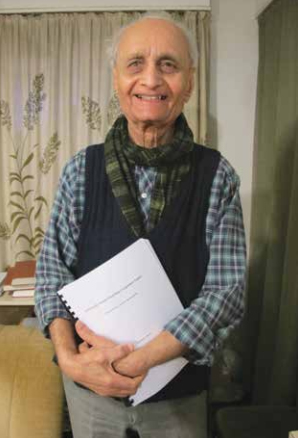
Centre of Jaina Studies Newsletter: SOAS - University of London
With the passing away of Professor Bansidhar Bhatt, who was born on 1 June 1929 in Veda (Gujarat) and died on 4 September 2016 in Jaipur (Rajasthan), the international community of Indologists has lost a renowned scholar and a highly-esteemed colleague.
Already in his student days Bhatt's great talent and unflinching dedication to his studies were honoured with university grants and scholarships in India and Germany. To mention only two: the Vedānta Prize (1955, University of Gujarat) and the Doctoral Scholarship (Graduiertenförderung, 1971-1974, Freie Universität Berlin). Honours followed throughout his career, for example the International Pārvatī Jaina Award (1984, Punjab) and the B. A. Shah Gold Medal (1998, Ahmedabad).
After his matriculation at the University of Bombay in 1946, Bhatt studied classical and modern languages and literature of India. In 1952 he acquired a bachelor's degree and in 1955 a master's degree. From 1957 until 1969 he was employed as Lecturer of Sanskrit at L. D. Arts College in Ahmedabad and at the School of Languages at the University of Gujarat.
It was a great and decisive step in his life when in 1969 he became a student at the Institut für Indische Philologie und Kunstgeschichte at the Freie Universität Berlin (financed by the India Foundation Loan Scholarship, Pune; he was one among the seven India-wide selected candidates for higher studies abroad). There he studied Sanskrit and Prakrit under Klaus Bruhn, Pali under Heinz-Jürgen Pinnow, Indian art history under Herbert Härtel, and Veda and Indo-Iranian studies under Bernfried Schlerath. In 1976 he passed the doctoral examination in Indian philology, Indian art history and Indonesian (Bahasa Indonesia). For his dissertation The Canonical Nikṣepa. Studies in Jaina Dialectics, published in 1977, Bhatt was awarded the summa cum laude degree.
In July 1976 he returned to India and was nominated Government of India Pool Officer for two years. He continued to work in his chosen scientific field at the Centre for Jaina Studies at the University of Rajasthan in Jaipur. In July 1978 he was appointed Professor (Mahāvīra Chair for Jaina Studies) at the Punjabi University in Patiala.
From 1 April 1985 until his retirement on 31 July 1995 he worked as Lector (Studienrat im Hochschuldienst) for Hindi and Gujarati at the Institut für Indologie at the Westfälische Wilhelms-Universität in Münster. In addition to his teaching, he tirelessly continued his Jaina studies and published numerous essays. Early in 2010 his health started to deteriorate. When his beloved wife Vasudhaben, who had always supported his work, died in Münster on 28 November 2012, he returned to his family in India. In his last years his research focused on the question of the historicity of the 23rd Jina Pārśvanātha. Death came to him shortly after the completion of this work.

Bansidhar Bhatt with the manuscript of his last book at his home in Münster (Photo: P. Flügel 2.2.2013)
It was his teacher Klaus Bruhn (1928-2016), who led Bhatt on the path of Jaina Studies. Guided by his guru, he found his ultimate scientific orientation: the exploration of the Āgama texts of the Jainas and their commentaries. He adopted the historical-critical method and investigated the ancient texts thoroughly and comprehensively, both in terms of their historical origins and development. Due to his most accurate analysis of these extensive and difficult to read text materials especially the socalled Āvaśyaka corpus he gained new and significant insights into the field of Jaina religion and philosophy.
In his book on the canonical nikṣepa, an interpretive technique used by Jaina ācāryas to discuss a subject or a word from different angles as a means of explaining the sacred scriptures to pupils, Bhatt collected and analysed almost all relevant material found in the old sacred texts of the Jainas, especially in the Bhagavatī, Jīvābhigama, and Prajñāpanā. His classification of the different forms of the nikṣepa and related phenomena, and his discussion of their historical development, was a great step to a proper understanding of Jaina scholastic methodology.
Another significant contribution to the history of Jainism is his work on the Jina Pārśvanātha (Bhatt 2017), the 23rd Tīrthaṅkara, who according to Jaina tradition lived about 250 years before Mahāvīra, the 24th Tīrthaṅkara and contemporary of the Buddha (Siddhārtha Gautama). Bhatt studied minutely the canonical texts and their commentaries and came to the conclusion that Pārśvanātha is not a historical figure, as some Indian and Western scholars still argue today, but a later invention to explain differences in the mode of asceticism emerging from a reform movement that took place in Jainism in the 3rd or 2nd century BCE.
Bhatt was a humble and friendly person, who loved to help his students and colleagues with patience and passionate commitment. Devoted to work and duty, he lived a very secluded and modest life. But when it came to scholarship, he knew no compromises. The search for truth stood above everything else. His radical attitude to any kind of interference or restriction of academic freedom led to his rejection of many offers of employment from privately financed institutions in the USA and India. He also did not shy away from public debates with Indian colleagues, who, biased by their religious beliefs, criticized his findings without evidencebased arguments.
All visitors to his home in Münster were enthusiastic about his ginger tea and the snacks that his wife had prepared. And when he offered somebody a candy in the library of the Institute, with an encouraging smile and the words "für die gute Laune" (for the good mood), this always brought about the intended effect.
He will certainly be very much missed by his colleagues, students and friends.
Kornelius Krümpelmann holds a doctorate from the Westfälische Wilhelms-Universität Münster (Germany), and was lecturer of Sanskrit and Prakrit at the Department of Indology and Buddhist Studies, GeorgAugust-Universität Göttingen (Germany). He is currently Research Assistant at SOAS (London) in the project Jaina Prosopography: Monastic Lineages, Networks and Patronage.
 Dr. Kornelius Krümpelmann
Dr. Kornelius Krümpelmann